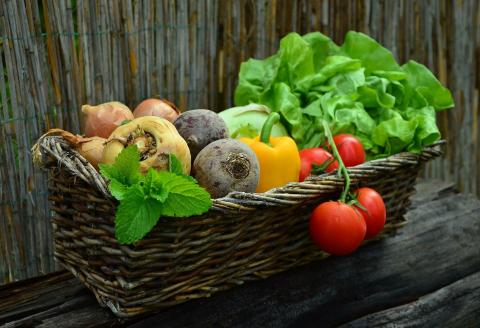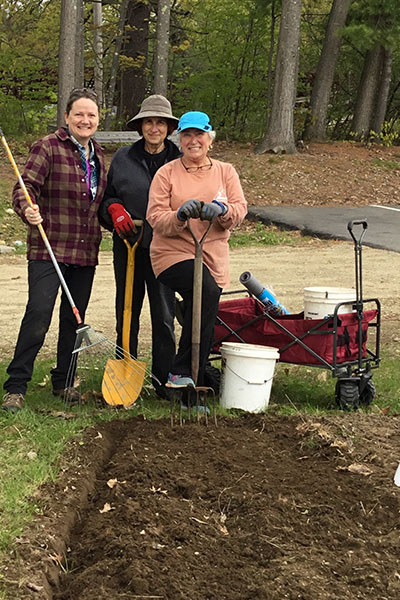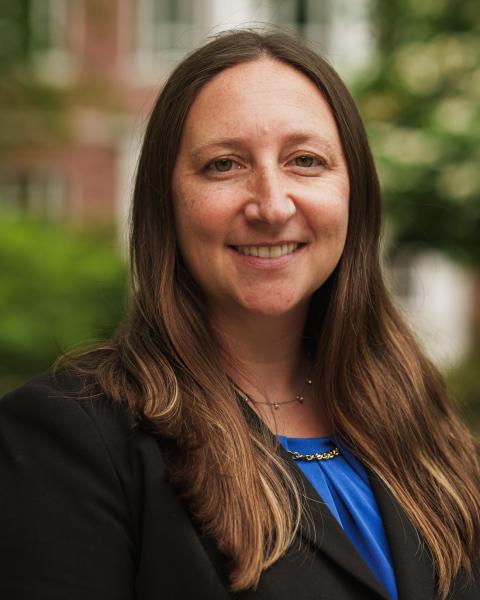The Garden Ladies

“Are we making pesto today?” is now a question commonly heard at the Boys & Girls Club of Souhegan Valley (BGCSV), located in Milford, New Hampshire. That’s because children are growing their own after-school snacks under the guidance of UNH Extension Master Gardeners, thanks to a kickoff grant from the Amherst Garden Club.
Sheila Steele of Amherst, Susan Makowiecki of New Boston and Kathie Breen of Merrimack are trained volunteers who share their enthusiasm for gardening with the general public. They began volunteering with the Boys & Girls Club in the spring of 2019 and are affectionately known by the children as “The Garden Ladies.”
Mike McKnight, who serves as the STEAM (science, technology, engineering, art and math) coordinator for the BGCSV, said Extension’s Master Gardener program has been instrumental in starting the garden. “They planned what we were going to do and what we were going to plant. They were the catalyst behind it all and made it successful. The kids love them,” he said.
After a vote, the children decided to name their garden “Da Garden Green of the BGCSV.”

Fresh Air and Healthy Snacks From the Garden
The BGCSV offers after-school programming as well as summer camps for hundreds of children primarily from Milford, Amherst, Hollis, Brookline, Mont Vernon, Peterborough, New Ipswich, Lyndeborough and Wilton.
Programs are designed for several age levels—children as young as kindergarten and as old as tenth grade.
On gardening days, groups of kids get to experience hands-on tasks like planting, watering and harvesting before engaging in a planned activity (such as building scarecrows) and then they enjoy a healthy snack that they have grown.
The boys and girls get to try new vegetables like kohlrabi and learn to cook from farm-to-table chefs. Over the summer, six raised beds provided 60-70 fresh salads from the garden to campers each Friday.
“We’ve had caprese salad with mozzarella balls and fresh tomatoes. We made pickles—the best pickles I’ve ever had. We’re trying to provide opportunities they may not get in school,” said McKnight.
The Master Gardener program started at Washington State University in 1973 and began in New Hampshire in 1993. Through this program, volunteers with an interest of any type of gardening are encouraged to expand their knowledge through a 12-week course offered through UNH Extension and then share that wisdom with their community through volunteerism.
By volunteering with schoolchildren, Steele, Makowiecki and Breen are empowering younger generations to care for the earth, appreciate the benefits of hard work, eat fresh vegetables and experience the wonder of spending time outdoors.
The BGCSV is securing additional funding so that this program can continue and so that it can expand its offerings. The Garden Ladies have already impacted hundreds of lives and are excited to reach more children and young adults in the coming year.
“They are giving back to the community and loving every minute of it,” said McKnight.
Become a Master Gardener
UNH Cooperative Extension will offer a 12-week Master Gardener training in Peterborough, NH starting in February 2020. The Master Gardener Program is part of a national effort to train people who are passionate about gardening so that they can become volunteers who share science-based horticultural knowledge with the public.
The training will be held at the headquarters of the Cornucopia Project each Thursday, 9:00 a.m. – 4:00 p.m. from February 27 through May 14. Weekly sessions will cover topics such as basic botany and plant physiology, soil science and ecology, entomology, plant pathology, horticultural research, and various gardening techniques. In addition, trainees receive instruction in adult learning, project management, and public speaking.
After completing the training, participants are expected to complete a 55-hour internship to become a Master Gardener. As a Master Gardener, a commitment of 20 hours of volunteer time and 10 hours of continuing education are required annually. Volunteers fulfill that commitment in various ways such as, responding to questions through the UNH Extension Education Center Infoline, providing garden-related talks to community groups or working on educational gardens in schools, nature centers, museums, community gardens, health care facilities and more.
Participants must submit an application and be interviewed before being accepted into the program. Applications will be accepted on a rolling basis until the program is full. Space is limited. A $300 fee will be charged to all accepted participants. Scholarships are available. For questions, contact UNH Extension Master Gardener Coordinator, Ruth Smith at ruth.smith@unh.edu.
